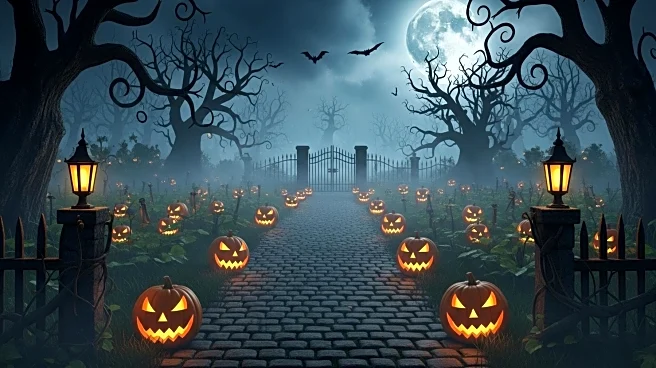What's Happening?
The Ghoul Garden Event in the game Grow a Garden has been launched, bringing Halloween-themed activities to players. This event includes a Halloween Market where players can purchase seeds, pets, and cosmetics using a new currency called Candy Corn. Players can earn Candy Corn by contributing crops to a witch's cauldron, which, when filled, provides event-related rewards such as Spooky Eggs and Pumpkin Crates. The event also features a Jack-o-Lantern NPC that appears every two hours, accepting Halloween plants and crops with Halloween mutations. The Halloween Market is available once per hour for 15 minutes, offering limited-time items for purchase.
Why It's Important?
The Ghoul Garden Event adds seasonal excitement to Grow a Garden, enhancing player engagement through themed activities and rewards. By introducing a new currency and limited-time items, the event encourages players to participate actively, potentially increasing game retention and community interaction. The event's focus on Halloween themes aligns with cultural festivities, providing players with a unique gaming experience that reflects real-world celebrations. This can lead to increased interest in the game during the holiday season, benefiting both the developers and the gaming community.
What's Next?
Players can expect continued engagement with the Ghoul Garden Event as they work to earn Candy Corn and acquire Halloween-themed items. The event's limited-time nature may prompt players to participate more frequently to maximize their rewards. Developers might introduce additional updates or events to maintain player interest beyond Halloween, potentially expanding the game's seasonal offerings. Community feedback on the event could influence future game updates, shaping the direction of Grow a Garden's development.
Beyond the Headlines
The Ghoul Garden Event highlights the growing trend of incorporating real-world holidays into virtual environments, offering players a sense of connection and celebration within the gaming world. This approach not only enhances player experience but also reflects broader cultural practices, demonstrating the intersection of gaming and societal traditions. As games continue to evolve, such events may become more prevalent, influencing how players interact with digital spaces.








